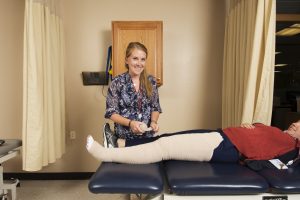Spotlight on Covid & Lymphedema Patients
March 23, 2022 Each year on World Lymphedema Day on March 6th, the staff of Helen Hayes Hospital’s Lymphedema Program raise awareness about the life-changing benefits of physical rehab for the estimated 250 million living with lymphedema—a disabling swelling condition. This year, HHH’s lymphedema specialists Erin Gonzalez, PT, DPT, CLT and Sheeja Slattery, PT, DPT, CLT also placed a special focus on raising awareness about several important topics pertaining to Covid-19 and Covid-19 vaccination for individuals with lymphedema:
Each year on World Lymphedema Day on March 6th, the staff of Helen Hayes Hospital’s Lymphedema Program raise awareness about the life-changing benefits of physical rehab for the estimated 250 million living with lymphedema—a disabling swelling condition. This year, HHH’s lymphedema specialists Erin Gonzalez, PT, DPT, CLT and Sheeja Slattery, PT, DPT, CLT also placed a special focus on raising awareness about several important topics pertaining to Covid-19 and Covid-19 vaccination for individuals with lymphedema:
Vaccination recommendations for patients with lymphedema:
It is recommended for those with lymphedema to receive the Covid-19 vaccination. If an individual has lymphedema or is at risk of lymphedema, they should receive their vaccination on the opposite arm or leg.
New vaccination/mammogram recommendations:
A recent research study conducted by Wolfson, et al., published in the February 2022 issue of Radiology Journal has found that axillary adenopathy is a common imaging finding and can persist as long as 43 weeks following administration of the Covid-19 vaccination. It is recommended to receive screening mammograms as needed and not delay 4-6 weeks post vaccination as was previously recommended.
The impact of the Covid-19 pandemic on patients with lymphedema:
The physiological and mental effects of the Covid-19 shutdown and restrictions are continuing to be studied. A study published in the January 2022 issue of Lymphatic Research and Biology has found that pandemic shutdowns have had a great impact on lymphedema patients’ health in both medical and psychosocial aspects. Weight gain was reported as a common issue among study participants and many skipped self-care methods. Many participants did not use their recommended compression garments, causing increased size in limbs and poor fitting garments. 11% of participants developed wounds and 17% developed cellulitis (a common infection with lymphedema). 63% of those patients with cellulitis were admitted to the hospital. Many participants also reported a high incidence of sleep problems and feelings of anxiety and stress.
The Lymphedema Program at HHH is committed to providing patients with the comprehensive tools they need to best manage the physical and mental aspects of their condition, especially during recent trying times. Under the orders and clearance of a physician, following a thorough evaluation, our lymphedema patients are treated by therapists trained and certified in complete decongestive therapy (CDT)—the least invasive but most intensive treatment approach. Patients will generally be seen for one hour per day, two to five days per week, for two to six weeks. A long-term course of treatment will be decided and discussed following the consultation, as lymphedema is a chronic condition and must be managed for life. Treatment consists of patient education, skin care, manual lymphatic drainage (MLD), which is a specialized massage to help stimulate the lymphatic system, compression, and exercise.
Please join in thanking our lymphedema specialists for sharing their wealth of knowledge with our community and for dedicating their careers to helping our patients with lymphedema live better lives! To help spread awareness about lymphedema during the month of March, please share our Facebook and Twitter posts on the topic and/or visit www.lymphaticnetwork.org/wld.
